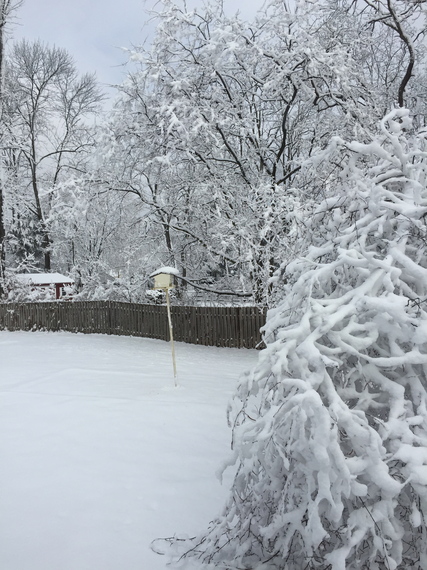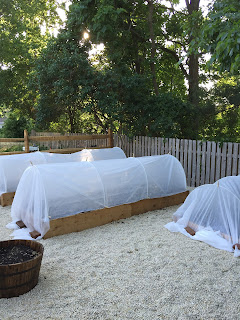This week's Torah portion, Chukkat, (Num. 19:1-22:1) begins with the laws of the red heifer, continuing to recount the events of the first two years of the Israelites in the wilderness. Then, as chapter 19 ends and chapter 20 begins, we are projected thirty eight years into the future as we learn of the death of Miriam, Moses striking the rock and God's decree that because of Moses' lack of faith, he would not be permitted to lead the people into the Land, the death of Aaron and the perpetuation of the high priesthood through his son Eleazar. The final chapter of the parshah concerns further wanderings of the people, and skirmishes with the kings Sihon and Og.
After the laws concerning the red heifer, the Torah has nothing at all to say about the thirty eight years before the death of Miriam. Of course we know that after the incident of the spies, the fear and lack of faith that the Israelites showed caused God to decree that they would not enter the land until the last of the generation who had been slaves in Egypt had died. They were going to start afresh with the new generation, born in the wilderness. It is as if the Torah, which had lovingly described so many details of the lives of the Israelites, now loses interest in anything they do until the new generation is ready to take over. It is a time of preparation and strengthening for the time to come when God's promise will be fulfilled.
There are times in history when nothing seems to change much and there isn't much remarkable going on. Generally, these times precede momentous occasions of motion and upheaval. The former slaves ended their days in freedom. The new generation prepared for the occupation of the Promised Land to come, knowing that a greater burden would be upon them without the leadership of Moses. There are times in the lives of nations and in individuals when nothing may seem to be going on, but things are brewing under the surface.
Sunday, June 21, 2015
Monday, June 15, 2015
Lessons Learned From Winter
http://www.huffingtonpost.com/mary-walker-baron/lessons-learned-from-wint_b_7579898.html
Here's my most recent Huffington Post Blog -
The long New Jersey winter is finally finished. Even on these hot, summer days, though, my thoughts turn to winter and its many lessons some of which I may have actually learned. At the very least I had many opportunities for learning.
I learned, for example, that when the branches of the birch tree weighted down by heavy, wet snow touch the ground they will once again reach toward the sky. I watched it happen. The snow slowly melted. It fell in clumps to the ground. With each splat of snow the branches became lighter until finally they were free of their heavy burdens. I rejoiced with them. Lesson learned. Birch trees are strong and resilient.
Some other lessons learned didn't seem quite so obvious at least to my new to the East Coast mentality.
I learned that a gravel driveway can't be adequately plowed. The snow falls. The plow must leave at least three inches of snow or take away all the gravel. When the temperatures rise the snow melts into water. The temperature falls. The water freezes and soon the driveway looks more like a skating rink than something appropriate for either person or vehicle. Lesson learned -- either pave the driveway or learn to skate.
I learned that if trash and recycled containers are in a fenced area and if the gate to the fenced area is located in a place where water gathers and if the gate is closed when the water freezes the gate can't be opened especially if the gathered water is an inch or two deep which means that the ice is deep enough to keep the gate closed for quite some time. Along those same lines I also learned that a household could go a few weeks before putting out the trash becomes an urgent issue. Lesson learned. Leave the gate open if temperatures are expected to drop below freezing.
I also learned that chipping away the ice into which the gate was frozen and ultimately opening the gate doesn't solve the entire problem. In that same learning opportunity I also learned that trash and recycled containers also freeze to the ground. Lessons learned. First lesson learned was that it's pretty hard to dislodge frozen trash and recycled containers without tearing gaping holes into the bottoms of the containers. Second lesson learned, come winter it's a good idea to put those containers in a place where they won't freeze to the ground or to the cement without actually putting them inside the house.
While I was chipping away at the ice holding the frozen gate, a trusted family member suggested that I pour boiling water onto the ice. That seemed like a good idea so I put the teakettle on the burner. When it whistled I put on my heavy coat, went outside, and poured the boiling water onto the ice. I listened to the crackling and the hissing and then watched as the ice seemed to grow in size and hold the gate closed in an even tighter grip. The trusted family member called back a few minutes later.
"Don't pour boiling water on the ice. It might blow up!"
She had consulted with a friend who grew up in Maine.
Sometimes in the learning process it's important to consult with an expert. My good friend, Alan Levine, is expert at many things. I called him to find out if pouring boiling water on ice really could cause an explosion.
"Yes," he said. "But only under certain circumstances."
He then explained that if you put ice cubes in a glass and pour room temperature water over them the ice starts to make noise and crack. If you pour boiling water over ice cubes it will do more of that. In fact, we might even call what happens in that situation an explosion. This happens because the ice cubes themselves take time for the temperature to even out. The ice cube is hot on the outside and cold on the inside so there's a large temperature gradient. Frankly, I'm not sure I understood the physics behind his message, but I trust Alan completely.
Come to find out Alan holds a Ph.D. in applied mathematics from Brown University. His specialty is fluid dynamics. Before my call I only knew that he held a Ph.D. in something I didn't quite understand and was my good friend. Anyway, here's what Alan had to say (in my words not his): Water is, in addition to being the world's most valuable resource, very unique in its behavior. It really can change from steam to liquid to ice and still be water. Also, I actually could have melted the ice with the boiling water if I had only wanted to melt a very small area. The problem was that I wanted to melt a much larger area, say the area keeping the gate closed. The entire area of ice holding the gate needed to rise above 32 degrees for it to melt. My little teakettle didn't come close to raising the temperature of the entire area.
This phenomenon depended on the difference in temperatures (boiling water and ice) and the speed the boiling water is poured over the ice. A high gradient in temperature determines whether or not it explodes because whether or not ice explodes depends on temperature. Most things contract as they get colder. So does water until it reaches 39 degrees F at which point it starts getting bigger. If the temperature had been around 32 degrees when I poured the boiling water on the ice and if I had poured it rapidly on the ice I might have solved one problem while creating a completely different one. That's the way it sometimes is with explosions.
Alan also reminded me that the fact that water expands as it gets colder is what makes ice float. Ice is less dense than water. Most substances when they freeze fall to the bottom of their container. Not so with water. Unless we really freeze the whole thing it will always be ice on top and liquid underneath. This phenomenon is true only for water.
Lessons learned. Never hesitate to consult with a good friend. Also pouring boiling water from a small teakettle onto a large chunk of ice won't free the gate. Also, though probably not such an urgent lesson learned, it's really unlikely that the ocean will ever freeze solid.
Alan also reminded me to never try and lick a frozen pipe. Little did he know that I learned that lesson during my childhood. I am not, however, going to expand on that particular learning opportunity.
I also learned that even the harshest of winters will end and spring will come even if it has to sneak in between seasons. I learned that snow creates a magical silence. I also learned that as surely as it ended, winter will return.
Come winter I will try to remember the birch trees and their ability to resume despite heavy loads their reaching for that which is higher than themselves.
Lesson learned. Life goes on.

Here's my most recent Huffington Post Blog -
The long New Jersey winter is finally finished. Even on these hot, summer days, though, my thoughts turn to winter and its many lessons some of which I may have actually learned. At the very least I had many opportunities for learning.
I learned, for example, that when the branches of the birch tree weighted down by heavy, wet snow touch the ground they will once again reach toward the sky. I watched it happen. The snow slowly melted. It fell in clumps to the ground. With each splat of snow the branches became lighter until finally they were free of their heavy burdens. I rejoiced with them. Lesson learned. Birch trees are strong and resilient.
Some other lessons learned didn't seem quite so obvious at least to my new to the East Coast mentality.
I learned that a gravel driveway can't be adequately plowed. The snow falls. The plow must leave at least three inches of snow or take away all the gravel. When the temperatures rise the snow melts into water. The temperature falls. The water freezes and soon the driveway looks more like a skating rink than something appropriate for either person or vehicle. Lesson learned -- either pave the driveway or learn to skate.
I learned that if trash and recycled containers are in a fenced area and if the gate to the fenced area is located in a place where water gathers and if the gate is closed when the water freezes the gate can't be opened especially if the gathered water is an inch or two deep which means that the ice is deep enough to keep the gate closed for quite some time. Along those same lines I also learned that a household could go a few weeks before putting out the trash becomes an urgent issue. Lesson learned. Leave the gate open if temperatures are expected to drop below freezing.
I also learned that chipping away the ice into which the gate was frozen and ultimately opening the gate doesn't solve the entire problem. In that same learning opportunity I also learned that trash and recycled containers also freeze to the ground. Lessons learned. First lesson learned was that it's pretty hard to dislodge frozen trash and recycled containers without tearing gaping holes into the bottoms of the containers. Second lesson learned, come winter it's a good idea to put those containers in a place where they won't freeze to the ground or to the cement without actually putting them inside the house.
While I was chipping away at the ice holding the frozen gate, a trusted family member suggested that I pour boiling water onto the ice. That seemed like a good idea so I put the teakettle on the burner. When it whistled I put on my heavy coat, went outside, and poured the boiling water onto the ice. I listened to the crackling and the hissing and then watched as the ice seemed to grow in size and hold the gate closed in an even tighter grip. The trusted family member called back a few minutes later.
"Don't pour boiling water on the ice. It might blow up!"
She had consulted with a friend who grew up in Maine.
Sometimes in the learning process it's important to consult with an expert. My good friend, Alan Levine, is expert at many things. I called him to find out if pouring boiling water on ice really could cause an explosion.
"Yes," he said. "But only under certain circumstances."
He then explained that if you put ice cubes in a glass and pour room temperature water over them the ice starts to make noise and crack. If you pour boiling water over ice cubes it will do more of that. In fact, we might even call what happens in that situation an explosion. This happens because the ice cubes themselves take time for the temperature to even out. The ice cube is hot on the outside and cold on the inside so there's a large temperature gradient. Frankly, I'm not sure I understood the physics behind his message, but I trust Alan completely.
Come to find out Alan holds a Ph.D. in applied mathematics from Brown University. His specialty is fluid dynamics. Before my call I only knew that he held a Ph.D. in something I didn't quite understand and was my good friend. Anyway, here's what Alan had to say (in my words not his): Water is, in addition to being the world's most valuable resource, very unique in its behavior. It really can change from steam to liquid to ice and still be water. Also, I actually could have melted the ice with the boiling water if I had only wanted to melt a very small area. The problem was that I wanted to melt a much larger area, say the area keeping the gate closed. The entire area of ice holding the gate needed to rise above 32 degrees for it to melt. My little teakettle didn't come close to raising the temperature of the entire area.
This phenomenon depended on the difference in temperatures (boiling water and ice) and the speed the boiling water is poured over the ice. A high gradient in temperature determines whether or not it explodes because whether or not ice explodes depends on temperature. Most things contract as they get colder. So does water until it reaches 39 degrees F at which point it starts getting bigger. If the temperature had been around 32 degrees when I poured the boiling water on the ice and if I had poured it rapidly on the ice I might have solved one problem while creating a completely different one. That's the way it sometimes is with explosions.
Alan also reminded me that the fact that water expands as it gets colder is what makes ice float. Ice is less dense than water. Most substances when they freeze fall to the bottom of their container. Not so with water. Unless we really freeze the whole thing it will always be ice on top and liquid underneath. This phenomenon is true only for water.
Lessons learned. Never hesitate to consult with a good friend. Also pouring boiling water from a small teakettle onto a large chunk of ice won't free the gate. Also, though probably not such an urgent lesson learned, it's really unlikely that the ocean will ever freeze solid.
Alan also reminded me to never try and lick a frozen pipe. Little did he know that I learned that lesson during my childhood. I am not, however, going to expand on that particular learning opportunity.
I also learned that even the harshest of winters will end and spring will come even if it has to sneak in between seasons. I learned that snow creates a magical silence. I also learned that as surely as it ended, winter will return.
Come winter I will try to remember the birch trees and their ability to resume despite heavy loads their reaching for that which is higher than themselves.
Lesson learned. Life goes on.

Sunday, June 14, 2015
An Adjustment AND Torah Thoughts on Korach
Those following this series of Torah thoughts may have noticed that I usually post on Friday afternoon before the Sabbath. However, what I have been doing is catching the Torah portion at the end, not the beginning, of its week. Each Torah portion is read in synagogue on Monday, Thursday and Shabbat, and the upcoming Torah portion begins its week as the Shabbat of the past Torah portion draws to a close. Therefore, to give everyone a whole week to think about the portion of the week, I will now write Torah thoughts at the beginning of the week.
This week's Torah portion is Korach (Num.16:1-18:32). It describes a difficult time for the Israelites in the wilderness. In the previous two Torah portions, the children of Israel have been punished for complaining about the manna, and wishing for the food they had eaten in Egypt, and demoralized by the report of the scouts, that the land that God had promised them was inhabited by people too strong to overcome. Now, Korach incites a rebellion against the leadership of Moses and Aaron. Moses challenges the rebels to a standoff, to let God choose the leaders of Israel. God causes Korach and his followers to be swallowed up by the earth, and the earth closes over them.
This is too much for the children of Israel. They now begin to fear the Mishkan, the same Tabernacle that, not so long ago, they eagerly gave their possessions to build. They cry out, "Everyone who so much as ventures near the Lord's Tabernacle must die! Alas, we are doomed to perish!" (Num. 17:28) So God instructs Aaron to tell the people that henceforth only the priests and Levites will bear the guilt of any encroachment upon the sanctuary.
The Israelites in the wilderness experienced God in ways that we do not today. God tries to assuage their fears of the sanctuary by putting the burden on the priests. However, we know that, even now, religion has the potential to frighten people away when all they can see is punishment and retribution. Now, it is up to us, not God, to remove that burden of fear.
This week's Torah portion is Korach (Num.16:1-18:32). It describes a difficult time for the Israelites in the wilderness. In the previous two Torah portions, the children of Israel have been punished for complaining about the manna, and wishing for the food they had eaten in Egypt, and demoralized by the report of the scouts, that the land that God had promised them was inhabited by people too strong to overcome. Now, Korach incites a rebellion against the leadership of Moses and Aaron. Moses challenges the rebels to a standoff, to let God choose the leaders of Israel. God causes Korach and his followers to be swallowed up by the earth, and the earth closes over them.
This is too much for the children of Israel. They now begin to fear the Mishkan, the same Tabernacle that, not so long ago, they eagerly gave their possessions to build. They cry out, "Everyone who so much as ventures near the Lord's Tabernacle must die! Alas, we are doomed to perish!" (Num. 17:28) So God instructs Aaron to tell the people that henceforth only the priests and Levites will bear the guilt of any encroachment upon the sanctuary.
The Israelites in the wilderness experienced God in ways that we do not today. God tries to assuage their fears of the sanctuary by putting the burden on the priests. However, we know that, even now, religion has the potential to frighten people away when all they can see is punishment and retribution. Now, it is up to us, not God, to remove that burden of fear.
Friday, June 12, 2015
Monday, June 1, 2015
So Far So Good.
We need to make one more raised bed and perhaps buy a couple more half barrels or make a couple more containers out of discarded somethings or others. On Saturday we planted cantaloupe, grape tomato, zucchini, okra, eggplant, sweet pepper, beet, carrot, more collards, and cucumber. Plants are coming up in the first bed. It rained during the night and, yes, the covers did let moisture in or at least the soil got wet somehow.
Next chore is to figure out some sort of composting system.
So far so good.
Next chore is to figure out some sort of composting system.
So far so good.
Subscribe to:
Posts (Atom)







